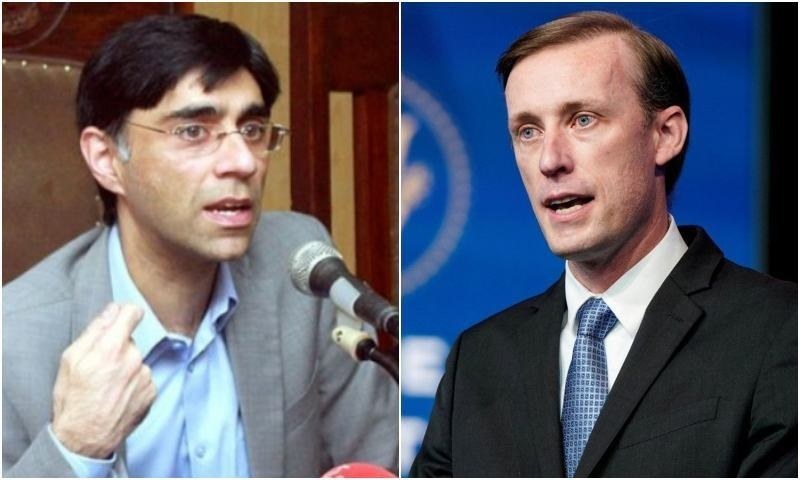The national security advisers (NSA) of Pakistan and the United States met in the US capital on Thursday, where they discussed the "urgent need for reduction in violence and a negotiated political settlement in Afghanistan".
NSA Moeed Yusuf and his American counterpart Jake Sullivan waited till Thursday evening to confirm their meeting, posting brief tweets stating that their talks also covered other issues of mutual interest.
This was the second meeting between the two officials who first met in Geneva in March.
“Had a positive follow-up meeting with NSA Jake Sullivan today in Washington,” Yusuf said in his tweet. “Took stock of progress made since our Geneva meeting and discussed bilateral, regional and global issues of mutual interest.”
Yusuf also said that the two sides “agreed to sustain the momentum in Pak-US bilateral cooperation”.
He did not mention Afghanistan among the issues discussed in the meeting but Sullivan devoted half of his tweet to the Afghan issue.
“I met with Pakistan’s NSA today to consult on regional connectivity and security, and other areas of mutual cooperation,” he said.
“We discussed the urgent need for a reduction in violence in Afghanistan and a negotiated political settlement to the conflict.”
The icebreaker in Geneva was the first highest-level physical contact between the two countries since the Biden administration took office.
US State Secretary Antony Blinken had spoken twice to Foreign Minister Shah Mahmood Qureshi and Army Chief Gen Qamar Bajwa before the Geneva meeting. Similarly, US Defence Secretary Lloyd Austin had also been in touch with Gen Bajwa.
US wants Pakistan to play its vital role, says Blinken
Blinken, who returned to Washington on Thursday evening after a visit to India and Kuwait, told an Indian television channel earlier in the day that Pakistan has a vital influence on the Taliban and the United States wants Islamabad to play that role.
“Pakistan has a vital role to play in using its influence with the Taliban to do whatever it can to make sure that the Taliban does not seek to take the country by force,” he told the Times of India TV. “And it does have influence, and it does have a role to play, and we hope that it plays it,” he added.
During his two-day stay in India, Blinken met External Affairs Minister Subrahmanyam Jaishankar and Prime Minister Narendra Modi in New Delhi and reviewed the latest developments in the region, particularly in Afghanistan, with them.
In an interview with ABC News, the top US diplomat said that he had received “deeply, deeply troubling” reports of atrocities in Afghanistan amid US withdrawal. And such reports "certainly do not speak well of the Taliban's intentions for the country as a whole.”
In another interview to Al Jazeera, Blinken warned that an Afghanistan that does not respect the basic gains of the last 20 years "will be a pariah in the international community".
The interviews, released by the secretary’s office in Washington, reflect the growing US concern that the Taliban were determined to take Kabul by force, rejecting international efforts for bringing a government that includes all Afghan factions.
Committed to withdrawing all US and Nato troops from Afghanistan by September 15, the Biden administration is now using its diplomatic influence to prevent a Taliban takeover and that’s where it sees a role for Pakistan.
While Pakistan also wants to prevent a military takeover in Kabul, Prime Minister Imran Khan told a US television show this week that the US decision to set a timetable for withdrawing troops had narrowed Islamabad’s options as well.
The prime minister indicated that the Taliban see the withdrawal as their victory and are less receptive to reconciliation efforts than they would have been had the timetable not been announced.
The Pakistani team, which arrived in Washington three days ago, is also busy explaining its position in meetings with senior US officials, lawmakers, think tank experts and media representatives.
It is not clear if Inter-Services Intelligence (ISI) Director General Lt Gen Faiz Hameed, who is also in Washington for the talks, attended the meeting between the two NSAs.




































